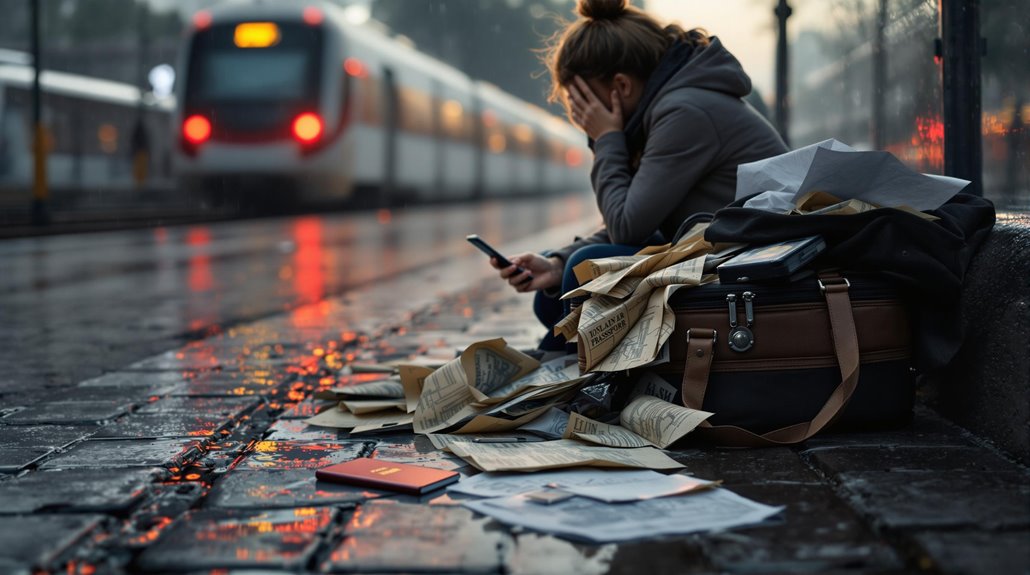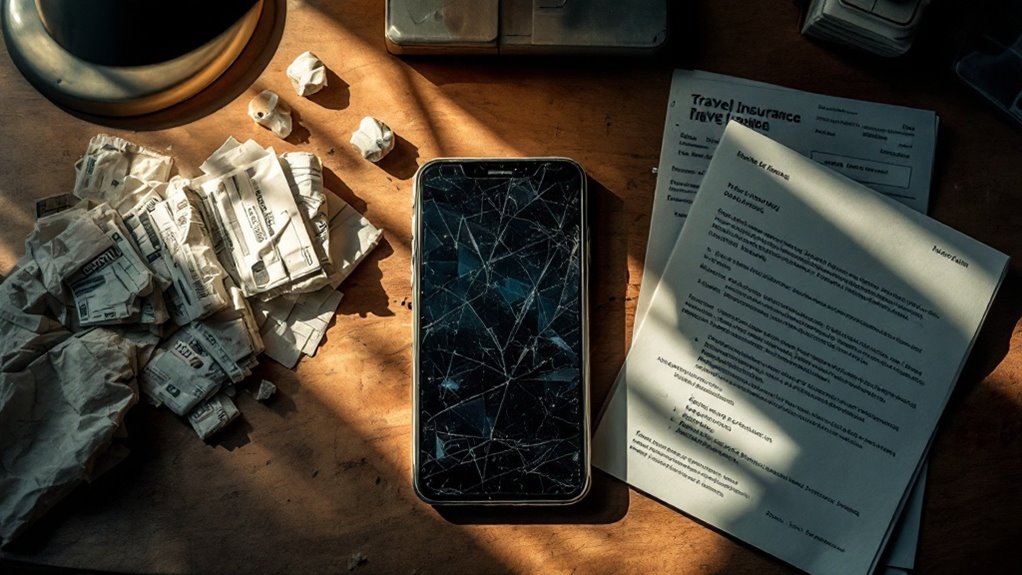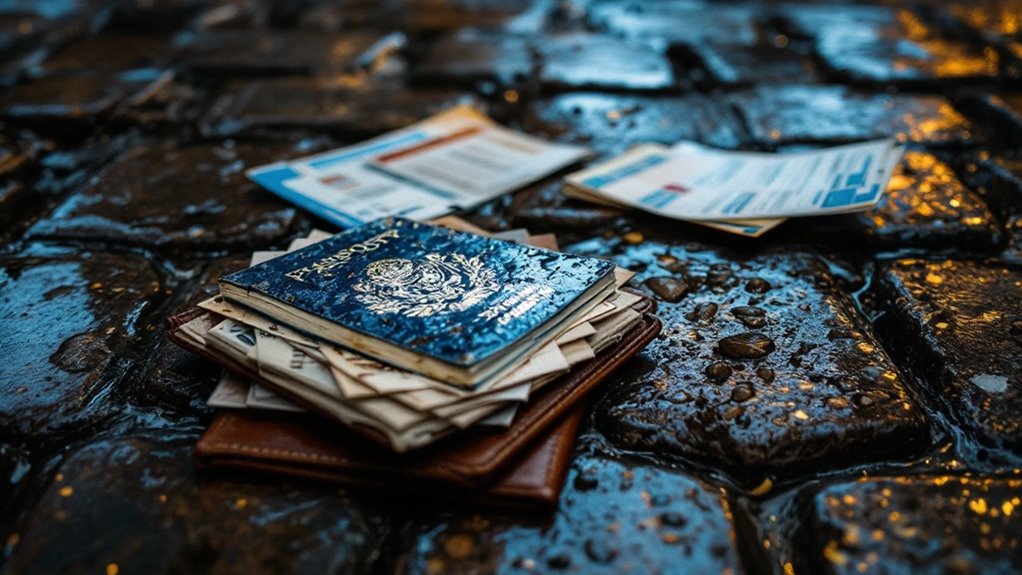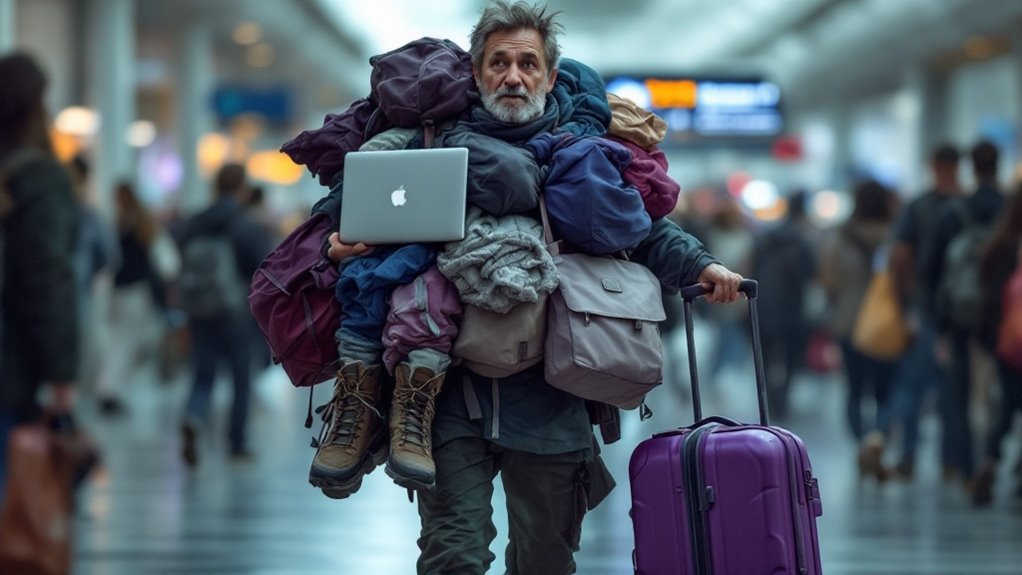Physical Address
304 North Cardinal St.
Dorchester Center, MA 02124
Physical Address
304 North Cardinal St.
Dorchester Center, MA 02124

When traveling solo, you'll want to avoid common pitfalls that can derail your adventure. Don't skip travel insurance or forget to share your itinerary with loved ones. Secure your documents, distribute valuables across different locations, and research local customs before departure. Be mindful of social media posts, pack light, plan evening transportation, learn basic phrases, and prepare for weather conditions. Your safety depends on smart preparation, and there's much more to reflect upon for a worry-free journey.

While many solo travelers focus on planning the perfect itinerary, they often overlook two critical safety nets: thorough travel insurance and a robust emergency contact system.
Don't become part of the 78% who skip adventure-specific coverage or the 34% who fail to share accommodation details with loved ones.
Adventure travel demands proper coverage – protect yourself and inform your family. Don't be another statistic risking it all.
You'll want extensive insurance that covers medical evacuations, which can exceed $100,000 in remote areas.
Make sure you're documenting your belongings with photos and receipts, as 63% of travelers can't properly file claims for stolen gear.
Keep your policy numbers and emergency contacts in multiple places – both digital and physical.
Consider using apps like TripIt to share real-time updates, as they've been shown to reduce emergency response times by 40%.
With World Nomads' team providing 24/7 emergency assistance and multilingual translation services, you'll have crucial support when you need it most.
Although it's tempting to share every moment of your adventure, posting too much on social media while traveling solo can put both you and your home at serious risk. Real-time updates and check-ins tell criminals exactly when your house is empty, making it an easy target for burglary.
Keep your travel details private until you're back home. Don't share your itinerary, accommodation information, or expensive purchases that might attract unwanted attention. Consider using remote device management to protect your social media accounts if your phone gets stolen.
Watch those privacy settings carefully – make sure your posts are only visible to trusted friends and enable two-factor authentication before you leave.
And please, avoid using public Wi-Fi networks for social media. Those hotel computers and unsecured networks are perfect spots for thieves to steal your login credentials.
Save the updates for when you're on secure connections.

Losing important documents abroad can instantly transform an exciting adventure into a nightmare of embassy visits and bureaucratic hurdles.
Don't make the rookie mistake of keeping all your documents in one place. Instead, create both digital and physical copies of your passport, visas, and other essential paperwork before departure.
Smart travelers create multiple copies of essential documents, keeping them separate to prevent catastrophic loss during their journeys.
Store encrypted digital copies in secure cloud storage and share access with trusted contacts back home. Keep physical copies in waterproof bags, distributed across different pieces of luggage.
When exploring daily, leave originals in your hotel safe and carry only necessary copies. For extra protection, invest in an RFID-blocking wallet and use a VPN when accessing sensitive information online. Consider adding tracking devices to your bags for real-time monitoring of your important documents.
When you're traveling solo, keeping all your valuables in one place is like putting all your eggs in one basket – it's a recipe for disaster if that bag gets stolen or lost.
You'll want to distribute your cash, cards, and important documents across different secure locations, including your day bag, hotel safe, and a hidden money belt or pouch. A fake wallet with cash can be a smart decoy to keep actual valuables safe from potential thieves.
Consider making digital copies of essential documents and keeping an emergency stash of cash separate from your main funds, as these backup measures can be lifesavers if something goes wrong.
Keeping all your money and valuables in one place while traveling solo creates unnecessary risk – much like putting all your eggs in one basket.
You'll want to distribute your funds across multiple secure locations using a combination of smart storage methods.
Keep your daily spending money easily accessible in a front pocket, while storing your backup cash in a hidden money belt under your clothes.
Stash emergency funds in non-obvious spots like empty sunscreen bottles or inside your shoe soles.
Don't forget to separate your credit cards – keep one in your wallet and another secured elsewhere.
When at your accommodation, take advantage of in-room safes for bulk cash storage, but maintain a small reserve elsewhere.
Always use smaller denominations of bills when exchanging currency to avoid drawing attention to yourself.
Just as you protect your money through strategic distribution, your important documents deserve the same careful consideration.
Don't make the rookie mistake of keeping all your documents in one spot. Instead, follow the triple redundancy rule: maintain your original documents, encrypted cloud copies, and physical backups.
Store one set of printed documents with a trusted contact back home and keep another in a waterproof bag.
For digital copies, use cloud storage with two-factor authentication, and consider encrypted external drives for larger files like photos. Popular services like Dropbox and OneDrive offer free storage tiers perfect for securing travel documents.
Keep your passport in your hotel safe while carrying only redacted copies for daily use.
Remember to sync important files across multiple devices and enable remote wiping capabilities – you'll thank yourself if your device gets stolen or lost.
A critical safety rule for solo travelers is never putting all your valuables in one bag or location.
Having everything in one place creates a single point of failure that could leave you stranded if theft or loss occurs. Instead, distribute your essentials strategically across different secure spots. Using the cross-packing strategy helps ensure you maintain access to vital items even if one bag is lost or stolen.
Doing your homework on local customs will help you avoid embarrassing or potentially dangerous cultural missteps during your solo travels.
You'll need to master a few basic phrases in the local language and understand essential cultural norms like greetings, personal space, and dining etiquette.
Before packing your bags, research appropriate dress codes for your destination, as what's acceptable at home might offend locals or draw unwanted attention abroad.
Taking time to understand local culture can lead to improved language skills and more meaningful connections with residents.
While packing your bags and plotting adventures might seem like the most essential travel prep, researching local cultural norms can make or break your solo journey. Understanding cultural sensitivities helps you blend in, stay safe, and show respect for local traditions.
Many travelers make the critical mistake of skipping local language basics, believing translation apps will suffice for their journey.
You'll quickly discover that relying solely on technology can leave you vulnerable during emergencies, offline situations, or when your battery dies.
Learning essential phrases like "police," "help," and "how much?" will protect you from scams and overcharging, while mastering numbers helps with transportation and purchases.
Using language learning apps like Duolingo and Babbel can help you master these essential phrases before your trip.
Don't underestimate the power of simple expressions like "delicious" or "thank you" – they'll open doors to authentic experiences and local recommendations that most travelers miss.
Even mispronounced attempts at the local language show respect and often lead to friendly interactions.
Speaking the local language only gets you halfway to cultural acceptance – proper attire completes the connection.
When you don't research dress codes before traveling, you'll likely face denied entry to religious sites, uncomfortable social situations, or even legal issues.
What's appropriate in your home country might be offensive or illegal elsewhere, from beachwear restrictions in Italian cities to tattoo coverage requirements in Japanese onsens.
In Italy, maintaining a reserved demeanor initially helps establish respect and acceptance within social settings.
Don't let improper attire become a barrier to experiencing local culture or cause unnecessary expenses from last-minute clothing purchases.
As you venture into unfamiliar territories during solo travel, safety should be your top priority.
Don't make the rookie mistake of skipping destination research – look up local customs, weather patterns, and common tourist scams before you arrive. You'll want to know which neighborhoods are safe and which areas to avoid.
Thorough research is your best defense – understanding local dynamics helps you navigate unfamiliar places with confidence and awareness.
Always share your whereabouts with trusted family members or friends, including hotel addresses and travel schedules.
Keep your valuables secure by using hotel safes and carrying minimal cash.
When it comes to transportation, stick to licensed taxis and research safe transit routes beforehand. Learning a few basic local phrases can help you navigate transportation and emergency situations more effectively.
And remember, while it's tempting to share your adventures on social media, avoid real-time posts that reveal your location.
Keep those stunning vacation photos for after you've moved on to your next destination.

While experienced travelers have mastered the art of packing light, newcomers often fall into the trap of bringing everything but the kitchen sink.
You'll regret overpacking when you're dragging heavy bags through crowded streets or paying excess baggage fees at the airport. Instead, focus on versatile items that serve multiple purposes and embrace the capsule wardrobe concept. Remember to leave extra space in your luggage for souvenirs and last-minute items you might acquire during your trip.
Here's what happens when you overpack:
Pack smart by rolling clothes instead of folding, using packing cubes, and limiting yourself to two pairs of shoes.
When traveling alone after sunset, you'll want to pre-book your evening transportation through trusted providers rather than risking last-minute arrangements that could compromise your safety.
For maximum protection, consider using commercial bus services, which account for less than 10% of annual traffic fatalities and maintain strict safety standards.
You should map out well-lit routes ahead of time and identify 24-hour transit hubs where you can safely wait if needed.
Don't forget to notify your hotel's front desk of your expected arrival time, especially for late check-ins, so they can better assist with your security needs and guarantee proper access to the property.
Planning your evening transportation ahead of time can make or break a solo travel experience. You'll want to secure reliable options before sunset, especially in unfamiliar destinations where public transit becomes limited after dark. Pre-booking through your accommodation guarantees fair pricing and eliminates the risk of encountering unlicensed operators. For safety and comfort, always inquire at reception about recommended transportation providers and routes.
Don't forget to carry local currency, as many night drivers won't accept cards. Keep smaller bills handy and budget an extra 15-20% for evening surcharges.
Beyond arranging reliable transportation, mapping out safe night routes demands your careful attention as a solo traveler.
Download offline maps and pre-mark emergency points like police stations and 24-hour businesses along your intended path. You'll want to consult your hotel staff about neighborhood safety and get their recommendations for well-lit routes with high foot traffic.
Don't let your GPS lure you into poorly lit shortcuts or deserted alleyways, even if they promise to save time. Stick to main roads where businesses are open and surveillance cameras are present.
Walk against traffic to stay aware of approaching vehicles, and avoid checking your phone too frequently in public. Instead, use a discreet earpiece for navigation and enable location sharing with trusted contacts for added security.
As your day of solo exploration winds down, keeping hotel staff informed of your plans becomes essential for your safety after dark. When you're out late, hotel personnel serve as your safety net, but they can only help if they know your whereabouts and schedule changes.
Don't hesitate to ask staff about their emergency procedures and available safety features.
They're there to protect you, but they need your cooperation to do their job effectively.
While traveling to foreign lands can be exciting, neglecting to learn basic local phrases puts you at serious disadvantage both for safety and cultural connection.
You'll struggle to communicate emergencies, navigate public transit, or even order food correctly. Don't assume everyone speaks English – that's a risky mindset that can leave you stranded.
Take time to master essential phrases like "please," "thank you," and "help."
Even if your pronunciation isn't perfect, locals appreciate the effort and are more likely to assist you. This basic knowledge helps you avoid scams, communicate allergies, and understand safety warnings.
Plus, you'll discover hidden gems like local restaurants and cultural events that travelers typically miss.

Since weather can change drastically during your travels, packing the right gear becomes essential for solo adventures. Without proper research and preparation, you'll find yourself caught off guard by sudden temperature shifts, unexpected storms, or harsh climate conditions.
Weather preparedness can make or break a solo journey. Pack smart to stay safe and comfortable in any climate.
Don't make the mistake of assuming one type of clothing will suffice for your entire journey.
Did you know that 58% of solo travelers report having at least one major mishap during their journeys? You don't have to be part of that statistic. By avoiding these common mistakes and following the practical advice above, you'll be well-prepared for your solo adventure. Remember, there's nothing quite like exploring the world on your own terms – just do it wisely and safely.